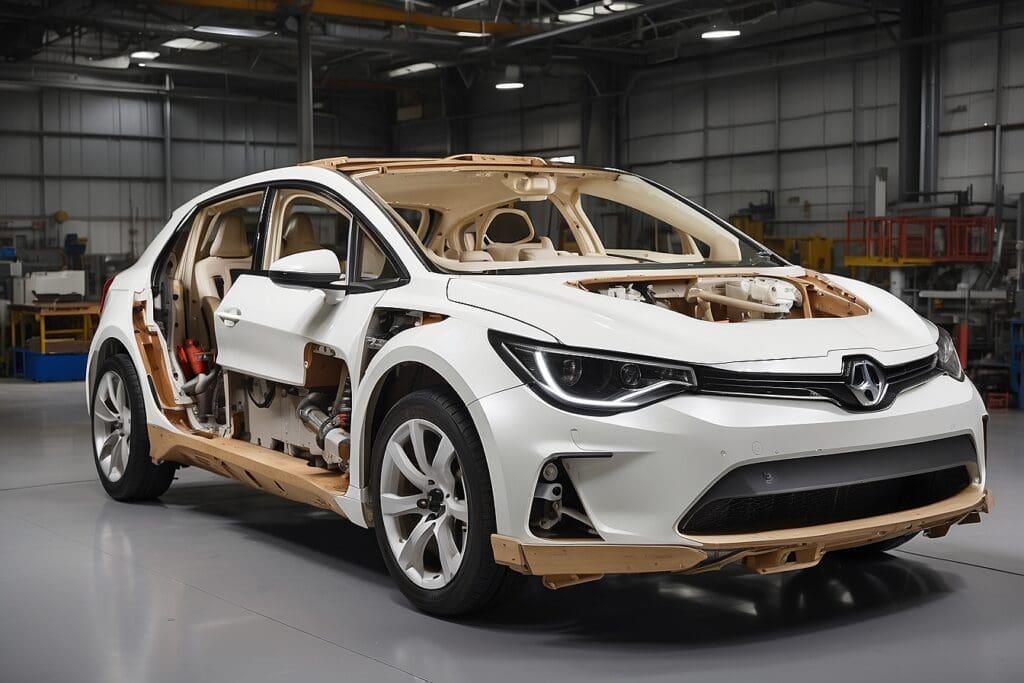We’re all on the lookout for cars that don’t hit our wallets – or the planet – too hard. Like you, we’ve had our radar up, scouting for ways to put a more sustainable spin on motoring.
In doing so, we’ve stumbled upon this heartening nugget of info: a whopping 95% of retired vehicles are given a new lease of life through recycling every year. As we delve further into this topic, it’s clear that car manufacturing is shifting gears towards greener pastures by welcoming recycled materials with open arms.
For those of us keen to tread lightly on Mother Earth while still enjoying the freedom of four wheels – there’s good news abrewing. Stick with us; it’s quite an uplifting tale that’s unfolding.
Key Takeaways
- Car manufacturers use recycled materials such as metals, plastics, rubber, glass, textiles and foam to reduce waste and environmental impact.
- There is growing interest in sustainable materials like plant-based biodegradable resources to make cars more eco-friendly.
- Innovations like 3D printing and smart textiles are advancing car manufacturing sustainability by reducing material waste and energy usage.
- Partnerships between car makers and recycling companies are enhancing circular economy practices to reuse vehicle components more efficiently.
- Despite resistance from some manufacturers, EU proposals push for increased recyclability of vehicles to drive the industry towards greener practices.
The Importance of Automotive Recycling
95% of retired cars are recycled every year, with materials such as steel, aluminum, glass, and rubber being reused. This significantly reduces the environmental impact of car manufacturing and disposal.
95% of retired cars are recycled every year
We take pride in knowing our efforts to sustain the environment are making a real impact, especially when it comes to automotive recycling. Out of every hundred cars that reach the end of their life, ninety-five find new purpose through recycling.
This staggering number represents a triumph for ecofriendly car manufacturing and stands as a testament to our commitment to environmental conservation.
Each vehicle brings valuable materials back into the production cycle, reducing waste and conserving resources. Metals such as steel and aluminium are salvaged and reformed to create new car parts or other products.
Even tires get a second life, often transformed into surfaces for playgrounds or incorporated into construction materials. Our push towards green vehicle manufacturing practices ensures that retired cars contribute positively rather than becoming pollutants languishing in landfills.
Materials that can be recycled
Car manufacturers are increasingly using materials that can be recycled to promote sustainable practices. We take a look at some of the recyclable materials being used in car manufacturing:
- Recycled metals, including aluminium, steel, and copper, are commonly used in cars due to their durability and ease of recycling.
- Reclaimed plastics from end-of-life vehicles can be repurposed for various car components, reducing the need for new plastic production.
- Rubber from old tyres is recycled into automotive parts such as floor mats and gaskets, contributing to a more circular economy.
- Glass from retired vehicles is crushed and reused in the manufacturing of new glass components for cars, reducing the demand for raw materials.
- Textiles like nylon and polyester are being recycled to create interior upholstery and other fabric-based car parts, minimising waste and promoting eco-friendly practices.
- Foam and padding materials from old cars are repurposed into soundproofing and insulation materials for new vehicles, reducing environmental impact.
- Electronic components such as batteries are being recycled through innovative processes to extract valuable metals like lithium and cobalt for reuse in electric vehicle production.
The Use of Sustainable Materials in Car Manufacturing

With the increasing focus on sustainability, car manufacturers are now using recycled plastics and biodegradable materials in their production processes. This not only helps reduce the environmental impact but also creates a circular model for sustainable car manufacturing.
Recycled plastics
Car manufacturers are increasingly turning to recycled plastics as a sustainable alternative for vehicle production. By using recycled plastics, we can reduce the amount of virgin plastic used and divert plastic waste from landfills.
These materials can be used in various car components such as bumpers, panels, and interior trim, contributing to the overall environmental impact of automotive manufacturing.
Recycled plastics also offer benefits in terms of energy savings and reduced greenhouse gas emissions. When compared to producing new plastic, recycling plastics consumes less energy and decreases reliance on fossil fuels.
Plant-based, biodegradable materials
Moving from recycled plastics to plant-based, biodegradable materials opens up new possibilities for environmentally friendly car manufacturing. By incorporating reclaimed wood, vegan leather, and other renewable resources into vehicle interiors and components, the automotive industry can significantly reduce its environmental impact.
These sustainable alternatives not only help in conserving natural resources but also contribute to a circular economy in car manufacturing by promoting green production practices.
With advancements in green technology, the integration of plant-based materials is paving the way for an era of truly eco-friendly vehicles that align with the values of conservation and environmental sustainability.
Advantages for the environment
Recycling materials for car manufacturing contributes to reducing the environmental impact of vehicle production. Using reclaimed and biodegradable materials in cars lowers the demand for new resources, decreasing deforestation and minimising energy consumption during extraction and processing.
This sustainable approach also helps to decrease the volume of waste sent to landfills, promoting a more circular model in automotive manufacturing.
Utilising recycled plastics and plant-based, biodegradable materials in car production reduces carbon emissions compared to traditional plastic and metal components. Additionally, incorporating eco-friendly manufacturing practices supports conservation efforts by preserving natural habitats while promoting a cleaner environment for all living beings.
Innovative Solutions for Sustainable Car Manufacturing

Innovative solutions for sustainable car manufacturing include alternative material technologies, developments in recycling high-value plastics, and partnerships for a circular model.
These advancements are crucial for creating a more environmentally friendly automotive industry.
Alternative material technologies
Car manufacturers are constantly exploring new material technologies to create more sustainable vehicles. These innovations play a vital role in reducing the environmental impact of car manufacturing and promoting a circular economy. Here are some alternative material technologies that are shaping the future of sustainable car manufacturing:
- Lightweight composites: Engineers are developing advanced composite materials, such as carbon fibre reinforced polymers, to reduce the weight of vehicles. This not only improves fuel efficiency but also decreases emissions during the vehicle’s lifecycle.
- Bio-based materials: Manufacturers are increasingly using renewable resources like soya-based foam and natural fibres for interior components. These materials are not only biodegradable but also reduce the dependency on fossil fuels in production.
- Recyclable metals: An increasing focus on using easily recyclable aluminium and magnesium alloys is seen as a way to make cars more environmentally friendly while reducing overall energy consumption during manufacturing.
- 3D printing: Additive manufacturing techniques allow for lighter and more efficient vehicle components, reducing material waste and energy consumption in production processes.
- Smart textiles: Integration of innovative fabrics made from recycled fibres into car interiors can aid in creating a more sustainable driving experience. Such fabrics often require fewer resources during their production while providing outstanding performance qualities.
Developments in recycling high-value plastics
Developments in recycling high-value plastics have led to more efficient processes, reducing waste and energy consumption. Advanced sorting technologies can now effectively separate high-value plastics from other materials, enhancing the recyclability of these valuable resources. Additionally, new chemical technologies allow for the breakdown of complex high-value plastics into their original components, enabling them to be reused in manufacturing processes with minimal loss of quality or properties.
Partnerships for a circular model
Car manufacturers are forming partnerships with recycling companies and material suppliers to create a circular model for sustainable car manufacturing. These collaborations aim to increase the use of recycled materials in vehicle production, promoting eco-friendly practices and reducing the environmental impact of the automotive industry.
By working together, these partnerships drive innovation in reclaiming and incorporating recycled plastics, as well as developing new sustainable materials for car components.
Furthermore, these alliances pave the way for advancements in energy recovery from end-of-life vehicles, contributing to the overall sustainability of automotive manufacturing processes.
The efforts put forth by these partnerships will further propel the development of environmentally friendly materials for electric vehicles, ensuring that sustainable production practices continue to expand within the automotive sector.
Opposition and Challenges to Sustainable Car Manufacturing
Resistance from some car manufacturers and the proposal by the EU for more recyclable cars present challenges, but with innovative solutions and collaborations, a sustainable future for car manufacturing is possible.
Read on to discover how we can overcome these obstacles for a greener automotive industry.
Resistance from car manufacturers
Car manufacturers have opposed the proposal for more recyclable cars by the EU. This resistance poses a significant challenge to sustainable car manufacturing initiatives. However, overcoming this opposition is crucial for creating a circular model in automotive production, using eco-friendly materials and reducing environmental impact.
Efforts to build more sustainably produced vehicles face resistance from car manufacturers – hindering progress towards environmentally friendly cars. Nonetheless, embracing change is essential if we are to advance towards a future of truly sustainable automotive manufacturing.
EU proposal for more recyclable cars
The EU proposal aims to increase the recyclability of cars, promoting the use of sustainable materials in manufacturing. This initiative focuses on reducing waste and environmental impact by encouraging car manufacturers to utilise more recycled and biodegradable materials.
By implementing this proposal, it will drive innovation in the automotive industry, fostering the development of eco-friendly technologies and practices for future vehicle production.
Promoting a circular economy model ensures that end-of-life vehicles become a resource rather than waste. The EU’s push for more recyclable cars aligns with global efforts towards sustainability, driving positive change for environmentally conscious individuals who support conservation and eco-friendly manufacturing initiatives.
Overcoming challenges for a sustainable future
To achieve a sustainable future, car manufacturers must confront the challenges obstructing the shift to eco-friendly materials. We can advocate for stricter regulations and incentives encouraging the use of recycled and biodegradable materials in vehicle manufacturing.
Partnerships between car manufacturers, recycling companies, and regulatory bodies can facilitate innovations in reclaiming high-value plastics and exploring alternative material technologies.
Car manufacturers should embrace change by investing in research and development for sustainable automotive materials. They need to collaborate with governments and environmental organisations to push for a circular model that promotes reusing end-of-life vehicles’ components.
Conclusion
In conclusion, car manufacturers are increasingly embracing the use of recycled materials and sustainable alternatives in their production processes. This shift towards eco-friendly manufacturing is steering the automotive industry towards a circular model that benefits both the environment and future generations.
By overcoming challenges and embracing innovation, we can drive towards a more sustainable and environmentally friendly future for car manufacturing. These efforts pave the way for more eco-conscious vehicle options and contribute to a healthier planet overall.
FAQs
1. What are recycled materials used for in car manufacturing?
Recycled materials, like reclaimed plastics and biodegradable fabrics, are used to make eco-friendly cars, supporting a sustainable circular model in the automotive industry.
2. Why is using recycled materials beneficial in producing cars?
Incorporating recycled materials into car production makes the process more environmentally friendly and helps manage end-of-life vehicles by reusing components.
3. Can electric vehicles be made with sustainable materials?
Yes, manufacturers use sustainable and ecologically sound materials to build parts of electric vehicles, reinforcing an eco-friendly approach to automotive design.
4. Are there any specific initiatives for recycling in the car industry?
The automotive sector has launched various recycling initiatives focusing on reclaiming and repurposing old vehicle parts into new, ecofriendly manufacturing processes.





